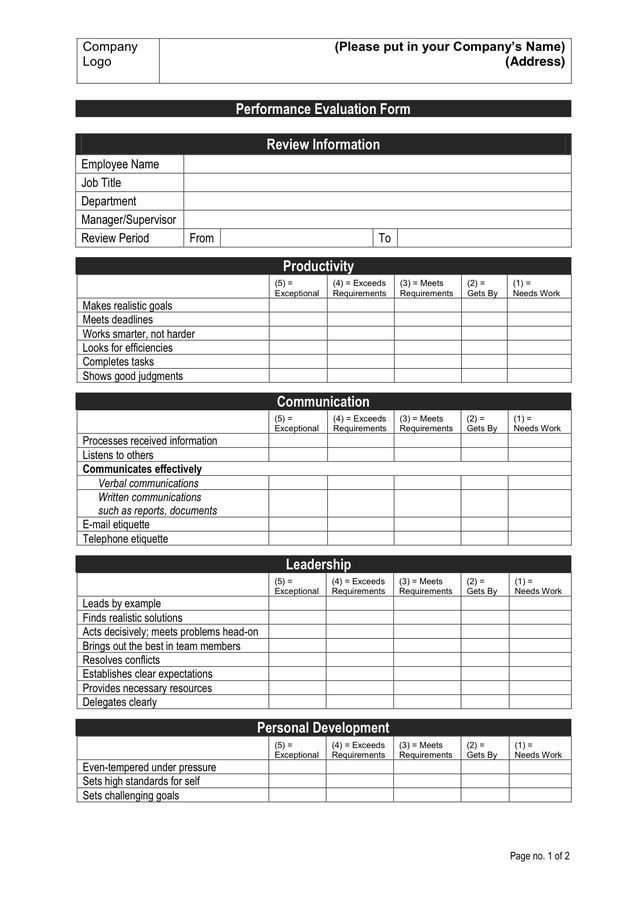Employee performance evaluation is a crucial aspect of any organization. It helps in assessing the overall performance of employees, identifying areas for improvement, and recognizing outstanding achievements. Commenting on employee performance evaluations plays a significant role in providing feedback and ensuring effective communication between managers and employees.

This article will explore the importance of commenting for employee performance evaluation and provide tips on how to effectively comment to enhance employee growth and development.
Why Commenting is Important for Employee Performance Evaluation?
Commenting on employee performance evaluations is essential for several reasons:
- Enhances communication: Commenting allows managers to provide specific feedback on employee performance, fostering open and effective communication.
- Encourages growth and development: Constructive comments help employees understand their strengths and areas for improvement, guiding them toward personal and professional growth.
- Recognizes achievements: Positive comments acknowledge employees’ accomplishments and boost their morale, leading to increased job satisfaction and motivation.
- Identifies training needs: Comments highlighting areas for improvement help identify training needs and enable managers to provide targeted development opportunities.
- Supports performance improvement: Commenting on performance issues provides employees with clarity on expectations and helps them take steps toward improvement.
- Celebrates success: Comments can be used to celebrate individual and team successes, fostering a positive work environment and encouraging collaboration.
- Builds trust and transparency: Regular comments on employee performance evaluations demonstrate a commitment to transparency and build trust between managers and employees.
How to Effectively Comment for Employee Performance Evaluation
When commenting on employee performance evaluations, it is important to follow these guidelines:
1. Be Specific and Detailed
Provide specific examples and details to support your comments. Instead of saying “You need to improve your communication skills,” say “During the team meeting on Monday, you interrupted others while they were speaking, which disrupted the flow of the discussion. It would be helpful if you could actively listen and wait for your turn to speak.”
2. Balance Positive and Constructive Feedback
Avoid focusing solely on the negative aspects of performance. Provide a balance of positive feedback to acknowledge achievements and constructive feedback to highlight areas for improvement. This approach fosters a positive and growth-oriented mindset.
3. Use Actionable Language
Frame your comments in a way that suggests specific actions for improvement. Instead of saying “You need to be more organized,” say “To improve your organizational skills, consider using a project management tool to track your tasks and deadlines.”
4. Be Objective and Fair
Base your comments on observable facts and avoid personal biases. Ensure that your comments are fair and unbiased, focusing on performance rather than personality traits.
5. Offer Support and Guidance
When providing constructive feedback, offer guidance on how employees can improve. Suggest resources, training programs, or mentoring opportunities that can assist in their development.
6. Set Clear Expectations
Communicate expectations and goals to employees through your comments. This helps them understand what is required of them and align their efforts accordingly.
7. Be Timely
Provide comments promptly, preferably soon after the performance event or evaluation. This ensures that the feedback is relevant and actionable.
8. Encourage Employee Self-Reflection
Ask employees to reflect on their performance and provide self-assessments alongside your comments. This encourages self-awareness and accountability.
Examples of Commenting for Employee Performance Evaluation
- Example 1: “You consistently meet deadlines and deliver high-quality work. Your attention to detail and problem-solving skills are commendable. To further excel in your role, consider taking on more leadership opportunities to enhance your decision-making abilities.”
- Example 2: “Your teamwork and collaboration skills have significantly improved over the past quarter. Your willingness to help others and actively contribute to team discussions is commendable. To further strengthen your communication skills, consider participating in a public speaking workshop.”
- Example 3: “Your time management skills need improvement. You have missed several deadlines, causing delays in project completion. To enhance your time management capabilities, consider using a time tracking tool and creating a prioritization system for your tasks.”
- Example 4: “Your ability to adapt to change and handle challenging situations is exceptional. Your positive attitude and resilience in the face of adversity are commendable. To further develop your leadership skills, consider taking on a mentorship role to guide and support junior team members.”
- Example 5: “Your creative problem-solving skills have been instrumental in finding innovative solutions for our clients. Your ability to think outside the box and come up with unique ideas is commendable. To further enhance your strategic thinking, consider attending a workshop on design thinking.”
- Example 6: “Your attention to detail and accuracy in your work are commendable. However, there have been instances of miscommunication with team members, leading to delays and misunderstandings. To improve your communication skills, consider attending a workshop on effective communication in the workplace.”
Conclusion
Commenting on employee performance evaluations is a valuable tool for effective communication, growth, and development. When done correctly, commenting provides employees with actionable feedback, encourages self-reflection, and builds a culture of trust and transparency. By following the guidelines outlined in this article, managers can make the most of their comments and contribute to the overall success of their employees and the organization as a whole.